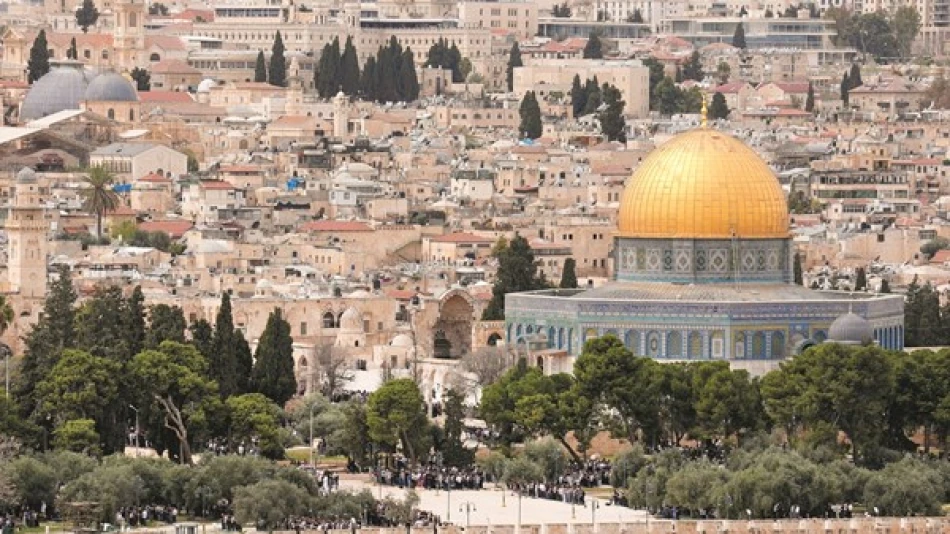
Extremist Settlers Storm Al-Aqsa Mosque: Tensions Escalate in Jerusalem
Israeli Minister Leads Mass Settler Incursion Into Al-Aqsa Mosque as Temple Movement Gains Political Ground
Israeli National Security Minister Itamar Ben-Gvir personally led over 1,250 Jewish settlers in a provocative raid on Jerusalem's Al-Aqsa Mosque compound, marking a dangerous escalation in the systematic campaign to alter the religious and legal status of Islam's third-holiest site. The unprecedented ministerial participation in what Palestinians call "storming" activities signals how far-right settler ideology has penetrated Israel's governing coalition.
Scale and Significance of the Incursion
The Islamic Waqf Department in Jerusalem reported that 1,251 extremist settlers entered the mosque compound during morning hours, conducting Talmudic prayers, dancing, and shouting throughout the sacred space under heavy Israeli police protection. Ben-Gvir's direct participation represents a qualitative shift from previous government policies that maintained at least symbolic respect for the site's Islamic character.
This wasn't an isolated incident. Palestinian religious authorities documented 27 separate settler incursions into Al-Aqsa during July alone, while Israeli forces prevented the Muslim call to prayer at Hebron's Ibrahimi Mosque 51 times in the same period—illustrating a systematic pattern of religious suppression.
The Temple Movement's Growing Political Influence
Jerusalem's governorate warned that these incursions stem from what it called "Temple organizations"—extremist groups seeking to demolish Al-Aqsa and construct a Third Jewish Temple. What makes this particularly concerning is how these fringe movements have gained unprecedented access to state power through Ben-Gvir's ministry.
The governorate described the campaign as "part of a calculated colonial settlement project aimed at undermining the legal and historical status of the mosque and imposing occupational sovereignty by force." This language reflects Palestinian fears that Israel is moving from managing the status quo to actively changing it.
Breaking Decades of Diplomatic Arrangements
Since 1967, Israel has maintained a delicate arrangement allowing Muslim worship at Al-Aqsa while restricting Jewish prayer to the Western Wall below. This understanding, though never formalized, helped prevent the Israeli-Palestinian conflict from becoming a broader religious war involving the entire Muslim world.
Ben-Gvir's actions shatter this framework. As a sitting minister, his participation legitimizes settler demands and signals potential government support for changing the site's religious character—a red line for Palestinians and the broader Arab world.
Regional and International Implications
Palestinian Authority spokesman Nabil Abu Rudeineh linked the mosque incursions to what he termed Israel's "genocidal war" against Palestinians, framing religious provocations as part of a broader campaign of ethnic cleansing. This rhetoric, while inflammatory, reflects genuine Palestinian fears about Israel's long-term intentions.
The timing is particularly volatile, coming amid ongoing conflict in Gaza and rising tensions across the West Bank. Any perception that Israel is targeting Islam's holy sites could trigger broader regional conflict, potentially drawing in countries that have remained on the sidelines of the current war.
What This Means for Middle East Stability
Ben-Gvir's mosque raid represents more than religious provocation—it's a calculated political move that serves his domestic base while potentially sabotaging any future peace negotiations. By normalizing settler presence at Al-Aqsa, he's creating facts on the ground that will be nearly impossible to reverse.
For regional powers like Saudi Arabia and the UAE, which have been cautiously engaging with Israel, these actions complicate normalization efforts. No Arab leader can be seen tolerating threats to Al-Aqsa without facing domestic backlash, potentially freezing the Abraham Accords expansion that both Israel and the US have prioritized.
The international community now faces a critical test: whether diplomatic protests will suffice, or if concrete measures are needed to prevent the transformation of a political conflict into an irreversible religious war.
Most Viewed News

 Layla Al Mansoori
Layla Al Mansoori






